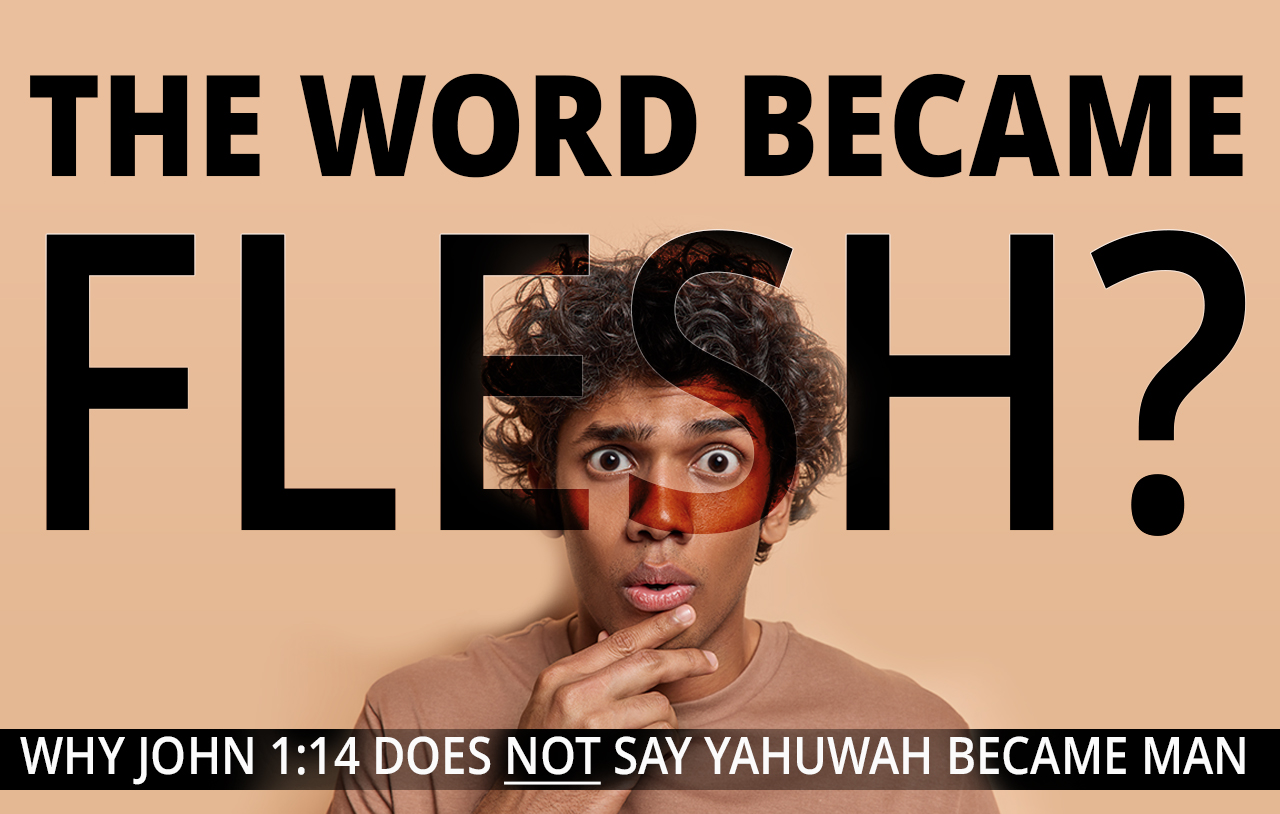The Word Became Flesh? Why John 1:14 Does NOT Say Yahuwah Became Man
|
This is a non-WLC article. When using resources from outside authors, we only publish the content that is 100% in harmony with the Bible and WLC current biblical beliefs. So such articles can be treated as if coming directly from WLC. We have been greatly blessed by the ministry of many servants of Yahuwah. But we do not advise our members to explore other works by these authors. Such works, we have excluded from publications because they contain errors. Sadly, we have yet to find a ministry that is error-free. If you are shocked by some non-WLC published content [articles/episodes], keep in mind Proverbs 4:18. Our understanding of His truth is evolving, as more light is shed on our pathway. We cherish truth more than life, and seek it wherever it may be found. |

For many Trinitarians or those who believe in the “deity of Christ,” a few words from John 1:1 combined with a few words from John 1:14 forms the, and I mean the #1 evidence that Yahushua is Yahuwah and that therefore somehow Yahuwah is a Trinity. John 1:1 says, “The Word was God,” and then skips down to John 1:14, “The Word became flesh.” That’s it. Yahushua is Yahuwah, literally.
However, this article will focus on the problems with the “deity of Christ” interpretation of John 1:14.
Jerusalem, we have a Problem:
Problems with the Trinitarian and Deity of Christ Interpretation of John 1:14
The “deity of Christ” interpretation of John 1:14 may sound or look plausible at first. Still, a little closer examination shows that the interpretation is only a thin veneer and that there is no substance behind the veneer. The “God became man” interpretation is a confusing web of inconsistencies, contradictions, and lies.
The first observation about interpreting John 1:1 and John 1:14 as saying that “God became man”:
No Trinity
The word “God” Theos occurs some 1320 times in the New Testament, which never means the Trinity.
|
There is no Trinity described in John 1:14 (or John 1:1). If you are a Trinitarian, and John 1:1 and John 1:14 are your primary proof texts for your understanding of who Yahuwah is, you better look further because there is no Trinity God anywhere near John 1:1 or John 1:14, or anywhere else in the Gospel of John. The word “God” Theos occurs some 1320 times in the New Testament, which never means the Trinity.
So “God” in the Gospel of John is never the Trinity. This Gospel claims that Yahushua revealed Yahuwah. But Yahushua revealed the Father, not a Trinity. The author of the Gospel of John was not a Trinitarian. Since the author of the Gospel of John did not believe God is a Trinity, he would be excluded from most “Christian” churches today and called a heretic.
10 Words out of 18,000, “The Ten Words”
The “deity of Christ” understanding of who Christ is reads too much into about ¼ of one verse. The Greek text of John 1:14 has 23 words, and the phrase from which the deity of Christ theology has created its most important, essential understanding of the nature of Yahushua comprises five words.
OK, we must add another 1/3 of a verse from John 1:1, another 4 or 5 words. So, according to the deity of Christ believers, the most crucial truth upon which your and my destiny hangs are about 5 words from John 1:1 and another five words from John 1:14. From John 1:1, “and the word was God…”, then skip down to John 1:14, “and the word became flesh.” That’s it. Forget what both Moses and Yahushua said is the most important commandment, that Yahuwah is one (Deut. 6:4, Mark 12:29). Forget that Yahuwah throughout the Law, Prophets, Writings, and New Testament is one. These 10 Greek words, five plucked from John 1:1 and five from John 1:14, have declared that God is more than one person.
This is the kind of interpretational methodology that cults and deception are made of. The Gospel of John has over 18,000 words in the average English translation. There are over 184,000 words in the New Testament. By picking and focusing on a few words and ignoring the context of the words, one can make a big book like the Bible say just about whatever one wants it to say.
Interpreting the short phrases in John 1:1 and John 1:14 as describing a second God, a “God the Word” or “God the Son” or a “Son God” “becoming a man” is a complete contradiction to everything that has come before in the Bible and everything that comes after.
|
Interpreting the short phrases in John 1:1 and John 1:14 as describing a second God, a “God the Word” or “God the Son” or a “Son God” “becoming a man” is a complete contradiction to everything that has come before in the Bible and everything that comes after. There is no “God the Son” in the Bible. There is no “God the Word” in the Bible. There is no second God person anywhere in the Books of Moses or any of Israel’s prophets.
Look at the declarations of the apostles of Yahushua in the Book of Acts. The apostles never preached about a multi-person God when they preached about Yahushua. They preached that the Messiah, the man Yahushua of Nazareth, had been put to death by people but then raised from the dead by Yahuwah (Acts 2:22-36, 3:15, 4:10, 5:30, 10:40, 13:30). Listeners were being saved. They had never heard about or believed in a second God-person, let alone a Trinity. The language and the idea of a “God-man” are foreign to the Scriptures. Instead, a “God-man” is the stuff of pagan mythology.
The Incarnation, THE Greatest Story NEVER Told
It is doubtful that John 1:14 is intended to be an incarnational description of a pre-existent deity becoming flesh since the Gospel of John nowhere describes the conception or birth of Yahushua. Nothing. There is not a single word about the circumstances of Yahushua’s conception or birth. Later in this chapter, the disciple Philip introduced Yahushua to Nathaniel as the one “of whom Moses in the Law and also the prophets wrote, Yahushua of Nazareth, the son of Joseph.”
Think about that. To the modern deity of Christ believer, the Gospel of John is the leading New Testament book that supposedly tells us that Yahuwah turned into, or became, human. Yet, in this Gospel, there is no description of this supposedly important event. The whole theory hangs on five words of John 1:14, “so the Word was (or became) flesh.”
The Incarnation is the most remarkable story never told, at least not in the Bible.

The Magically Disappearing Essence, or the Magically Disappearing Nature.
Three Persons in One Essence but One Person in Two Natures.
The Trinitarian describes who his God is by saying that the Trinity is three persons in one essence. This is how three can be one—three persons in one nature.
But the very description of their God, given by the Trinitarians, testifies against their core belief that Yahuwah became man. In providing his description of the Trinity, the Trinitarian forgets that his essential doctrine drawn from John 1:1 and 1:14 is that “God the Word became flesh.”
“Yahuwah is three persons in one essence,” claims the Trinitarian. OK, got it. Ahh…hang on. Didn’t you just tell me that Yahushua is God who became human flesh? Isn’t your whole religion based upon “God became a man” of God taking on human nature?
So, like a magician adept at sleight of hand, Trinitarianism - by its very own definition of who God is - eliminates the “humanity” or the “flesh” of Yahushua the Messiah.
|
So, like a magician adept at sleight of hand, Trinitarianism - by its very own definition of who God is - eliminates the “humanity” or the “flesh” of Yahushua the Messiah.
Trinitarian world, make up your mind. You’ve had 1600 years. Does your God have one essence or two? One minute, your God has one essence. The next minute, he (they?) has two essences.
If you are a Trinitarian or “deity of Christ” believer, may I ask, if God the Son took on flesh, how many natures does the Trinity have? I’m not asking how many natures “Yahuwah the Son” has, but how many natures does the tri-personal God have? Why has the standard explanation for 1600 years been that the Trinitarian God is three persons in one essence?
If you think John 1:14 means that Yahuwah became flesh, then your Trinitarian God has two natures. Your theologians have been wrong, contradicting themselves for hundreds of years. Or, is all the “deity of Christ” theological jargon only a magician’s smoke-screen to eliminate the flesh from Yahushua the Messiah?
A Trans-essence Yahuwah
I suggest trinitarian Christians are being hypocritical when they condemn transgender or lesbian, or gay people who claim to be a different gender than they are.
The transgender person goes through an operation and insists: “I am now female,” even though he is male.
As a Trinitarian, I insisted that “God became man.” That means that one member of the tri-personal God is trans-natured. But even though “God the Word” was trans-natured, I insisted that he was still fully God and fully man! Our “deity of Christ” claim that “Yahushua has two natures” even goes further than the transgender claim. It would be like a transgender person insisting: “I am fully male and fully female.”
It’s all an abomination to the God Yahuwah and His Messiah Yahushua from Nazareth.

Christian Trinitarian, are you not being hypocritical in condemning a transgender who insists he is female and must be referred to by a female pronoun at the same time, you claim that one of your tri-personal God members is trans-essence and insist on using a singular pronoun for your tri-personal God?
History is against you
Because enough writings of early gentile “church fathers” have been preserved, a historian can discover and trace how and when the idea that an eternal second person of a godhead became part of accepted Christianity.
In the second century, 100 years after Yahushua, there was no one God in three persons in the “church fathers” thinking.
|
In the second century, 100 years after Yahushua, there was no one God in three persons in the “church fathers” thinking. Instead, 2nd-century church fathers began to adopt the Greek philosophical view of the Logos (the Word), considered a secondary lesser God, claiming this was the pre-existent Christ.
However, that Logos was considered by the early Gentile church fathers to be a lesser God who owed his origin to the one true God. To the second-century church fathers, the Logos was not co-equal or co-eternal with the One Supreme Yahuwah.
Even the famous Nicene Creed of AD 325 is not Trinitarian. Note the first statement in the Creed: “We believe in one God, the Father Almighty, Maker of all things visible and invisible.” Christians in AD 325 still insisted they were monotheists by emphasizing the superiority of the one God, the Father. It wasn’t until later in the 4th century, some 350 years after Yahushua the Messiah lived in Israel, that gentile “Christians” in modern Turkey declared that they were monotheists because their God consisted of three persons in one essence.
If you think Christians were always Trinitarian or that Christians considered Yahushua always to be co-equal and co-eternal with the Father, you aren’t being honest with history. Most Christians, especially Protestants, don’t know much and don’t care much about church history. They’ve just been told that “Christians always believed that Yahushua is God and that God is a Trinity.”
Ignoring the Rest of the Gospel of John
Interpreting John 1:1 and 1:14 as Yahuwah becoming man ignores the rest of the contents of the Gospel of John.
The Messiah who Represents Yahuwah, not who Is Yahuwah Literally
The Yahushua of Nazareth of the Gospel of John is not Yahuwah literally but represents, reveals, and is empowered by Yahuwah. Yahuwah sent Yahushua as Yahuwah’s representative, as Yahushua said, “Whoever sees me sees Him who sent me” (John 12:45).
In this Gospel, the author distinguishes Yahushua from Yahuwah, and Yahushua distinguishes himself from Yahuwah continually (e.g., 3:16, 8:40, 15:1, 16:30, 14:1, “Believe in Yahuwah, believe also in me”). Yahushua is distinct from one person of a Godhead and all of Yahuwah. For instance, Yahushua describes himself as “a man who told you the truth that I heard from Yahuwah” (John 8:40).
“Father…this is eternal life, to know you, the only true God, and Yahushua the Messiah whom you have sent.” (John 17:1-3)
|
Yahushua in this Gospel, over and over again, says things like, “I do nothing on my own authority, I do nothing by my own power, I do nothing by my own initiative” (5:30). “My teaching is not mine, but his who sent me” (7:16). “Father…this is eternal life, to know you, the only true God, and Yahushua the Messiah whom you have sent” (17:1-3).
An eternal Yahuwah, even if he had “become flesh,” would never say such things.
Sure, the deity of Christ proponents point to a handful of other short statements in the Gospel of John to claim the “deity of Christ,” like “I and the Father are one” (10:30) or “my Lord and My God” (20:28). But it doesn’t take much thought to see the problems with these short “proof-text” interpretations, and that there are other, better ways to understanding these statements. This “proof-texting,” taking a handful of short statements out of context, ignores much of the Gospel. We shouldn’t forget the other 18,000 words in the Gospel of John to bolster our Greco-Byzantine pagan idea that the Jewish Messiah is a second Yahuwah figure who took on flesh.
Ignoring the Context of the Prologue: Context, Context, Context
Understanding John 1:14 as a reference to an incarnation conception and birth of Yahuwah is chronologically out of place after John 1:6-13 summarizes the co-ministry of Yahushua and John the Baptizer.
The prophet John the Baptizer as an adult has already borne witness that Yahushua was the true light (1:6-8). It does not make historical or literary contextual sense to think that after introducing and summarizing the relationship and ministries of Yahushua and John the Baptizer in verses 1-13, all of a sudden, the author reverts to a few words about the incarnation of one person of a tri-personal God.
All incarnation interpretations of John 1:14 ignore that the man Yahushua, whom this Gospel is about, is presented in an introductory and summary manner in verses 1-13.
Interpreting John 1:14 as “Yahushua is Yahuwah” ignores and contradicts the next few verses in John’s prologue, not the least of which is the statement just four verses later that “no one has ever seen Yahuwah” (1:18). Yahushua was seen by thousands of people, but no one has ever seen Yahuwah.
Ignoring and Contradicting the Words of Yahushua
But what does Yahushua say? Does he ever claim to be Yahuwah? Does he ever claim to be “God the Son”? Does he say, “When you see me, you see God the Son?” According to Yahushua, the Messiah, which God do we perceive when we see Yahushua? Or, more appropriately, “who” do we see when we see Yahushua?
The deity of Christ's interpretation of John 1:14 contradicts what can be considered the central theme of the Gospel and the words of Yahushua recorded in this very same Gospel.
|
Not “God the Son.” Yahushua said when you see him, you see the Father. The deity of Christ's interpretation of John 1:14 contradicts what can be considered the central theme of the Gospel and the words of Yahushua recorded in this very same Gospel. Yahushua reveals the Father.
Yahushua said: “He who sees me has seen the Father…Do you not believe that I am in the Father and the Father in me? The words that I say to you I do not speak on my own authority; but the Father who dwells in me does his works.” (John 14:9-10). There is no “Yahuwah the Son” in Yahushua. The God that is revealed in Yahushua is the Father.
Contradicting the Purpose Statement of the Author
Interpreting John 1:1 and 1:14 as Yahuwah becoming man ignores the purpose statement of the author of this Gospel. The author told us that he recorded the signs that Yahushua did so that we would believe that Yahushua is the “Messiah, the Son of Yahuwah” (John 20:31). Son of Yahuwah is the title for the Messianic king descended from David. The author does not tell us that he recorded the signs so that we would believe that Yahushua is Yahuwah, or “God the Son.” We should not interpret John 1:14 as contradicting the author’s stated purpose. Do we think we know better than the author why he wrote his book?

It Gets Worse – Yahushua is Not a Human Person
But the worst of all of the reasons that the deity of Christ's interpretation of John 1:14 is wrong is because the interpretation denies that Yahushua, the Messiah from Nazareth, is a human person.
I know most Christians don’t realize this. If you are a Trinitarian or deity of Messiah believer, you probably think, “No, I don’t deny that Yahushua is a human person.” But you do. You have to. Otherwise, you have two persons walking around in Yahushua. And the church decided long ago for you that Yahushua is not two persons but one person, the eternally divine person “God the Son.” As the Council of Chalcedon in Constantinople stated in AD 451 - some four hundred years after the Jewish Messiah Yahushua was on earth – the human and God natures of Yahushua existed “in one Person and one Personhood, not parted or divided into two persons.”
It’s pretty simple. Suppose there was only one person in Yahushua, and church theologians and dogma over the centuries have said the one person is the “eternal God person,”. In that case, Yahushua is not a human person.
The deity of Christ's interpretation of John 1:14 insists that Yahushua is “fully man, but he is not a man.” Or that “Yahushua is fully human, but he is not human.” Is something “fully human” if it is only human nature and not a human person? Does such speculation sound like good biblical teaching or pagan Greek philosophy, or a fairy tale?
To conclude
What if those five words in John 1:14 meant something different in a Jewish, Hebraic context compared to how they were understood hundreds of years later by Gentiles with a very different cultural and philosophical way of thinking?
How we interpret a verse like John 1:14 depends significantly on what presuppositions we bring to the text. If, like Western thinking Greco-Roman Byzantine philosophers, we think there can be such a thing as “non-human human nature” that can be personalized by someone who is not human, we might interpret John 1:14 the way traditional Christianity has.
The best way to interpret the book of John is within the background and culture of 1st-century Judaism.
|
But we should realize that the best way to interpret the book of John is within the background and culture of 1st-century Judaism. The 1st-century Jewish author used language and metaphors that would be understood by Jews of the 1st century but could be misunderstood and re-interpreted by non-Jews into the mythical realm of the Greco-Roman-Byzantine world. John is not writing about a mythical God-Man but about the Messiah Yahushua of Nazareth, a human person who was put to death and then raised from the dead by his God, the God of Israel.
Considering all the problems and contradictions we’ve noted above with interpreting John 1:14 as a statement that “God became man,” are there other ways to understand what John 1:14 is saying? Could the author tell us that the Word, the ultimate way Yahuwah communicated, was the human being, the flesh, the man Yahushua of Nazareth?
“And the name he was called is the Word of Yahuwah.” Hmmm. Sounds familiar.
The cost for interpreting John 1:1 and John 1:14 as “God became man” is eliminating the human person, Yahushua of Nazareth. Are you sure you want to pay the cost?
And remind me again, how many natures does the Trinitarian God have?

This is a non-WLC article by Bill Schlegel.
We have taken out from the original article all pagan names and titles of the Father and Son, and have replaced them with the original given names. Furthermore, we have restored in the Scriptures quoted the names of the Father and Son, as they were originally written by the inspired authors of the Bible. -WLC Team








